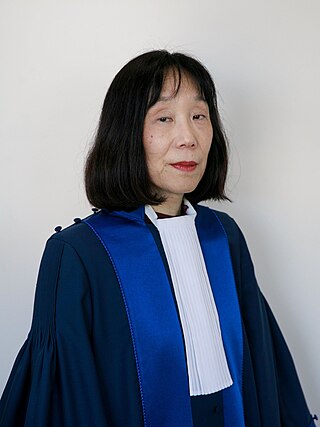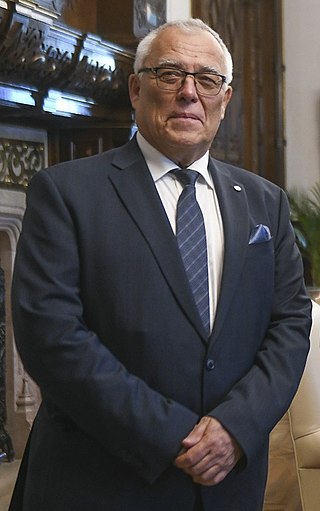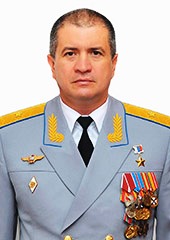
The International Criminal Court is an intergovernmental organization and international tribunal seated in The Hague, Netherlands. It is the first and only permanent international court with jurisdiction to prosecute individuals for the international crimes of genocide, crimes against humanity, war crimes and the crime of aggression. The ICC is distinct from the International Court of Justice, an organ of the United Nations that hears disputes between states.
Universal jurisdiction is a legal principle that allows states or international organizations to claim criminal jurisdiction over an accused person regardless of where the alleged crime was committed, and regardless of the accused's nationality, country of residence, or any other relation to the prosecuting entity. Crimes prosecuted under universal jurisdiction are considered crimes against all, too serious to tolerate jurisdictional arbitrage. The concept of universal jurisdiction is therefore closely linked to the idea that some international norms are erga omnes, or owed to the entire world community, as well as to the concept of jus cogens – that certain international law obligations are binding on all states.

International criminal law (ICL) is a body of public international law designed to prohibit certain categories of conduct commonly viewed as serious atrocities and to make perpetrators of such conduct criminally accountable for their perpetration. The core crimes under international law are genocide, war crimes, crimes against humanity, and the crime of aggression.
Thomas Lubanga Dyilo is a convicted war criminal from the Democratic Republic of the Congo (DRC) and the first person ever convicted by the International Criminal Court (ICC). He founded and led the Union of Congolese Patriots (UPC) and was a key player in the Ituri conflict (1999–2007). Rebels under his command have been accused of massive human rights violations, including ethnic massacres, murder, torture, rape, mutilation, and forcibly conscripting child soldiers.

The International Criminal Court has The International Criminal Court has opened investigations in Afghanistan, the Central African Republic, Côte d'Ivoire, Darfur in Sudan, the Democratic Republic of the Congo, Kenya, Libya, Uganda, Bangladesh/Myanmar, Palestine, the Philippines, and Venezuela. Additionally, the Office of the Prosecutor conducted preliminary examinations in situations in Bolivia, Colombia, Guinea, Iraq / the United Kingdom, Nigeria, Georgia, Honduras, South Korea, Ukraine and Venezuela. Preliminary investigations were closed in Gabon; Honduras; registered vessels of Comoros, Greece, and Cambodia; South Korea; and Colombia on events since 1 July 2002.

The states parties to the Rome Statute of the International Criminal Court are those sovereign states that have ratified, or have otherwise become party to, the Rome Statute. The Rome Statute is the treaty that established the International Criminal Court, an international court that has jurisdiction over certain international crimes, including genocide, crimes against humanity, and war crimes that are committed by nationals of states parties or within the territory of states parties. States parties are legally obligated to co-operate with the Court when it requires, such as in arresting and transferring indicted persons or providing access to evidence and witnesses. States parties are entitled to participate and vote in proceedings of the Assembly of States Parties, which is the Court's governing body. Such proceedings include the election of such officials as judges and the Prosecutor, the approval of the Court's budget, and the adoption of amendments to the Rome Statute.

The eighteen judges of the International Criminal Court (ICC) are elected for nine-year terms by the member-countries of the court. Candidates must be nationals of those countries and they must "possess the qualifications required in their respective States for appointment to the highest judicial offices".

Karim Asad Ahmad Khan is a British lawyer specialising in international criminal law and international human rights law, who has served as Prosecutor of the International Criminal Court since 2021.

The International Criminal Court investigation in Uganda or the situation in Uganda is an ongoing investigation by the International Criminal Court (ICC) into the Lord's Resistance Army insurgency which has been taking place in northern Uganda and neighbouring regions since 1987. The Lord's Resistance Army is a Christian-based group led by Joseph Kony that is accused of numerous human rights violations and war crimes including massacres, the abduction of civilians, the use of child soldiers, sexual enslavement, torture, and pillaging. After the government of Uganda referred the matter to the ICC in December 2003, warrants of arrest were issued in 2005 for Joseph Kony, Raska Lukwiya, Okot Odhiambo, Dominic Ongwen, and Vincent Otti, who became the first people to be indicted by the Court.

The International Criminal Court investigation in the Democratic Republic of the Congo or the situation in the Democratic Republic of the Congo is an ongoing investigation by the International Criminal Court (ICC) into crimes committed in the Democratic Republic of the Congo (DRC) during the Second Congo War and its aftermath, including the Ituri and Kivu conflicts. The war started in 1998 and despite a peace agreement between combatants in 2003, conflict continued in the eastern parts of the country for several years. In April 2004 the government of the DRC formally referred the situation in the Congo to the International Criminal Court, and in June 2004, prosecutor Luis Moreno Ocampo, formally opened an investigation. To date, arrest warrants have been issued for:

Tomoko Akane is a Japanese jurist and a current judge at the International Criminal Court (ICC) for Japan, as well as the president of the court.

Piotr Józef Hofmański is a Polish jurist and judge who has served as President of the International Criminal Court (ICC) from 2021 to 2024 and a judge of the ICC from 2015 to 2024. Prior to his tenure as a judge of the ICC, Hofmański was a legal expert and advisor at the Council of Europe.

The International Criminal Court investigation in Ukraine or the Situation in Ukraine is an ongoing investigation by the Prosecutor of the International Criminal Court (ICC) into "any past and present allegations of war crimes, crimes against humanity or genocide committed on any part of the territory of Ukraine by any person" during the period starting "from 21 November 2013 onwards", on an "open-ended basis", covering the Revolution of Dignity, the Russo-Ukrainian War including the 2014 annexation of Crimea by Russia, the war in Donbas and the 2022 Russian invasion of Ukraine. The ICC prosecutor commenced these investigations on 2 March 2022, after receiving referrals for the situation in Ukraine from 39 ICC State Parties.

During the Russian invasion of Ukraine, national parliaments including those of Poland, Ukraine, Canada, Estonia, Latvia, Lithuania and Ireland declared that genocide was taking place. Scholars and commentators including Eugene Finkel, Timothy D. Snyder and Gregory Stanton; and legal experts such as Otto Luchterhandt and Zakhar Tropin, have made claims of varying degrees of certainty that Russia is committing genocide in Ukraine. A comprehensive report by the Raoul Wallenberg Centre for Human Rights concluded that there exists a "very serious risk of genocide" in Russia's invasion of Ukraine.

Luz del Carmen Ibáñez Carranza is a Peruvian jurist and judge at the International Criminal Court (ICC) in The Hague, Netherlands. Ibañez Carranza is the first Peruvian judge at the ICC. Before being elected as a judge at the ICC, she was a prosecutor and professor in Peru.
The proposed International Criminal Tribunal for the Russian Federation is a proposed ad hoc international criminal tribunal aimed at prosecuting the Russian Federation and senior Russian and Belarusian leaders for the Russian invasions of Ukraine as one or more crimes of aggression, as a complement to the existing International Criminal Court investigation in Ukraine. Several international bodies announced their support for its establishment, including the Council of Europe, the European Commission, the NATO Parliamentary Assembly and the European Parliament.

The International Criminal Court opened a proprio motu investigation in the Situation in Georgia on 27 January 2016 to look into war crimes and crimes against humanity that may have occurred in and around South Ossetia in the context of an international armed conflict between Georgia and Russia between 1 July and 10 October 2008. The investigation phase was announced to have been completed on 16 December 2022. In the course of it, the three high-ranking officials in the Russian-backed South Ossetian government — remaining at large as of the time of the announcement — were subjected to arrest warrants for crimes committed against Georgian civilians. The fourth suspect, a senior Russian general, was not indicted as he had died in 2021.

On 17 March 2023, following an investigation of war crimes, crimes against humanity and genocide, the International Criminal Court (ICC) issued arrest warrants for Vladimir Putin, the President of Russia, and Maria Lvova-Belova, Russian Commissioner for Children's Rights, alleging responsibility for the war crime of unlawful deportation and transfer of children during the Russo-Ukrainian War. The warrant against Putin is the first against the leader of a permanent member of the United Nations Security Council.
Sergio Gerardo Ugalde Godinez is a jurist and judge from Costa Rica, and a current judge at the International Criminal Court (ICC). Before he was a member of the Permanent Court of Arbitration and an ambassador of Costa Rica to the Netherlands.

Sergey Ivanovich Kobylash is a Lieutenant general and Commander of the Long-Range Aviation branch of the Russian Aerospace Forces.












